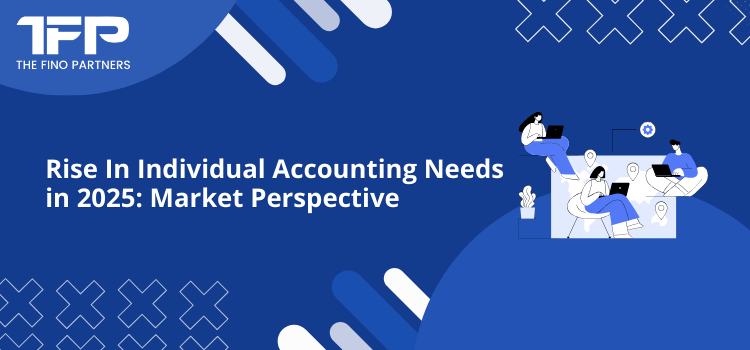As the world market for accounting services continues to increase steadily along its rising path, it is expected to cross a staggering $1 trillion by the year 2034, a rather huge and significant change is unraveling currently in the United States.
Accounting services, previously mostly the preserve of the complex work of corporate accounting, are becoming more and more necessary and crucial to a wide range of individuals, from freelancers to digital investors, retirees, and ordinary families throughout the country.
In this blog, the surge in individual accounting needs in the United States market in 2025 is concluded under the seven reasons. Let us know more about them in detail.
1. Rapid Expansion of Freelancers and Gigs to Fulfil Individual Accounting Needs
With over 60 million Americans in some type of freelance or gig work, it has become challenging to deal with irregular income, business expenses, and quarterly tax payments. That old W-2 job no longer occupies the dominance of employment.
- Self-employed individuals pay and cover their own Social Security and Medicare contribution, also called the self-employment tax.
- They typically come in for home office expenses, equipment, and travel, and it can be overwhelming to try to navigate through IRS rules.
As a consequence of the complexities they face, gig workers are significantly seeking the expertise of accounting professionals in order to receive assistance with meeting their individual accounting needs, optimizing their taxes and ensuring that they remain compliant with the relevant regulations and requirements.
2. A Rapid Transformation in the Complicated Tax Landscape
The U.S. tax code is known everywhere as complex, and it goes on to be more and more complex with every passing year. Many momentous developments and changes have left a steadily growing number of individuals searching for help from specialists within this complex field:
Continuing federal tax reform and changing standard deduction amounts
Federal tax laws keep changing and evolving to suit the demands of shifting times in society, with regular reforms being enacted that affect individual taxpayers as much as business taxpayers. One of the most salient aspects of such changing reforms is the amendment made to the amounts specified for normal deductions, which is a significant consideration in determining the aggregate tax burdens of the taxpayers. These adjustments are usually directed to making tax filing easier or to account for inflation.
State-by-state taxation rules
The recent surge in the prevalence of remote work has introduced a plethora of intricate and multifaceted problems related to state taxation. In most cases, the workers are free to reside in another state since they work for a business that is situated in a wholly different state, thus introducing a chain of multi-state tax burdens that need to be addressed. This rule gives rise in individual accounting needs by employees.
Laws regarding cryptocurrency
The IRS now requires full reporting of cryptocurrency transactions, and failure to comply can lead to severe penalties.
Limitations of Tax Programs for Complex Returns
Tax software packages have advanced a great deal and become increasingly capable, but even they sometimes fail to get some complex tax scenarios correct. These returns are not necessarily able to account for the fine nuances that can exist, especially in situations covering capital gains, rental income, or the complexity of multi-state returns.
3. The Significance of Diversification of Individual Investor Portfolios Towards Financial Growth and Stability
As literacy about money grows and apps like Robinhood, Fidelity, and Coinbase make investing more accessible, individuals are now coping with complex portfolios that include:
- Equities and ETFs
- Real estate ownership and REITs
- Foreign assets and cryptocurrency
These various asset classes are tied to corresponding reporting standards, special tax rules, and inherent risk factors that must be taken into account. Without the guidance and expertise of a professional, investors can face serious challenges, which possibly may lead to:
- Miss important tax deadlines.
- Miscalculate capital gains or losses
- Underreport foreign income, prompting IRS investigation An accountant prevents the erosion of portfolio performance due to avoidable tax mistakes.
4. More Emphasis on Retirement and Wealth Conservation
As life expectancy rises and as concerns over the long-term sustainability and viability of Social Security continue to grow, more Americans are taking a more proactive approach to planning for their retirement. That proactive approach is:
- Maximizing contributions to traditional IRAs, Roth and 401(k)s, and HSAs.
- Planning withdrawals in an efficient tax way.
- Planning for intergenerational wealth transfer via estate plans, trusts, and gifting strategies.
Financial planning has evolved as a core activity of accounting services which increases the individual accounting needs. Today's CPAs are not only form-fillers, they're long-term strategy partners.
5. An Increase in the Demand for Financial Regulation and the Demand for Global Compliance Requirements
Regulatory overreach has grown tremendously, involving not just local reporting obligations but now cross-border tax ones as well:
- FATCA and FBAR call for foreign bank account and asset reporting.
- The Infrastructure Investment and Jobs Act placed third-party payment services such as PayPal and Venmo under the category of needing 1099-K reporting on payments of over $600.
- The IRS has stepped up enforcement activity and audit rates, particularly among high-income individuals and crypto investors.
These changes imply that taxpayers require more than minimal tax assistance, they require accountants knowledgeable in risk management and compliance strategy.
6. Technology Gaps and the Constraints Suggested by Do-It-Yourself Tools
Although computer software such as TurboTax and H&R Block has become quite widespread and is available nearly everywhere, one must note that these programs are not without their limitations. These reasons give a rise to individual accounting needs:
- They usually do not take the role of dealing with complicated filings that are derived from multiple sources of income, income generated from business activities, or revenues that come from foreign sources.
- They can misreport deductions or underreport taxable income.
- They have low audit protection and are not tailored.
As online threats multiply exponentially, users increasingly find themselves becoming increasingly guarded and reluctant to upload their sensitive financial information onto cloud services. Accountants, in this respect, offer a priceless human layer of protection and expertise that technology, however sophisticated, cannot duplicate or supplant.
7. The Accountant's Role: Evolution from a Number-Cruncher to a Strategic Advisor
As reflected in the global market report, accounting firms are broadening services. They now provide:
- Fiscal forecasting and tax planning
- Retirement and estate planning
- Cash flow management and investment analysis
- Sustainability and ESG investment advice
This evolution has made CPAs worthwhile to every income level, not just the wealthy or corporate clients. Individuals now seek out accountants for guidance on important life decisions, like marriage, home purchase, or opening a small business.
Conclusion
The increase in demand for individual accounting services in the United States highlights significant shifts in the economy and society. The tax code is more complex, personal finances are more diverse, and individuals are seeking strategic, personalized financial advice more than ever. As the global market for accounting services grows rapidly, expected to hit $1.04 trillion by 2034, U.S. individuals will remain at the forefront of this transformation. Discover expert accounting services by talking to our experts and elevate your accounting experience.




























